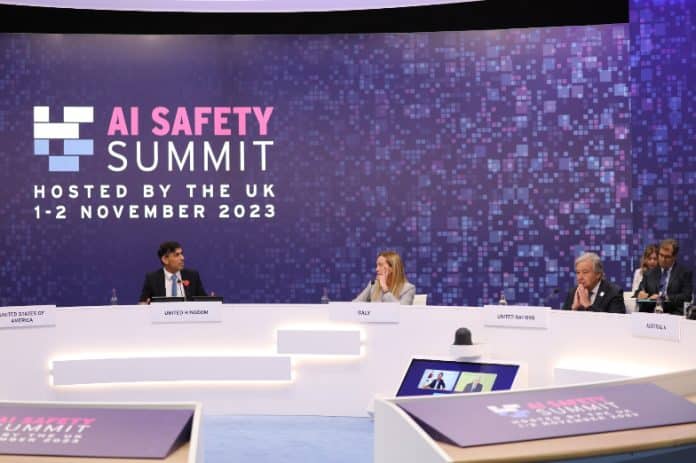The principles of Artificial Intelligence governance must be based on the UN Charter and the Universal Declaration of Human Rights, United Nations Secretary-General António Guterres urged at the AI Safety Summit in London on 2nd November.
Hosted by the UK government, the two-day event brought together international governments, leading AI companies, civil society groups and experts in research to consider the risks of AI and how they can be mitigated through internationally coordinated action.
Speaking on the second day of the summit, Mr. Guterres warned that “the speed and reach of today’s AI technology are unprecedented”, and that its many and varied associated risks “demand new solutions.”
A new agreement on AI safety

On the first day of the AI summit, 28 countries as well as the European Union agreed to the Bletchley Declaration on AI safety, which establishes “a shared understanding of the opportunities and risks posed by frontier AI”. Countries agreed to “the urgent need to understand and collectively manage potential risks through a new joint global effort to ensure AI is developed and deployed in a safe, responsible way for the benefit of the global community.”
Countries endorsing the Declaration included the United States, China, Brazil, France, India, Ireland, Japan, Kenya, the Kingdom of Saudi Arabia, Nigeria and the United Arab Emirates. The Declaration also highlighted that the risks of AI are “best addressed through international cooperation”.
Three AI governance action areas
During his statement, the Secretary-General outlined three action areas to address the growing gap between AI and its governance.
Firstly, he called for frameworks to deal with the risks of the release of powerful AI models which could be used “maliciously by criminals or even terrorists.”
The Secretary-General’s second area of action concerns AI’s possible long-term negative consequences. Job markets and economies could face disruption; there may be a loss of cultural diversity because of algorithms that perpetuate biases and stereotypes; and geopolitical tensions may rise if AI is concentrated in a few countries and companies.
“Longer-term harms extend to the potential development of dangerous new AI-enabled weapons, the malicious combination of AI with biotechnology, and threats to democracy and human rights from AI-assisted misinformation, manipulation, and surveillance,” Mr. Guterres added, calling for frameworks to monitor and analyse these trends to prevent them.
Finally, he outlined that without immediate action, AI will exacerbate the enormous inequalities that already plague our world. A recent report by Oxford Insights found that no African country is in the top 50 for AI preparedness.
AI has huge potential, Mr. Guterres nonetheless underlined. It can help governments to budget, business to expand, climate scientists to predict droughts and storms, as well as people to access vital healthcare and education. It could also be an accelerator for the 17 Sustainable Development Goals.
“But for that to happen, every country and every community must have access to AI – and to the digital and data infrastructure it requires,” Mr. Guterres said, calling for a “systematic effort” to change the fact AI technologies are currently limited to a few countries and companies.
A global effort
To prevent incoherence and gaps in governance, the Secretary-General is calling for global oversight of AI, outlining that the UN is “an inclusive, equitable and universal platform for coordination on AI governance.”
Last week, Mr. Guterres announced the creation of an AI Advisory Body, which brings together global expertise from governments, business, the tech community, civil society and academia. At the end of 2023, the Advisory Body will report with preliminary recommendations in three areas: strengthening international cooperation on AI governance; building scientific consensus on risks and challenges; and making AI work for all of humanity.
These recommendations will feed into the Global Digital Compact proposed for adoption by Heads of State at the Summit of the Future in September 2024.
“We need a united, sustained, global strategy, based on multilateralism and the participation of all stakeholders. The United Nations is ready to play its part,” concluded the Secretary-General.




